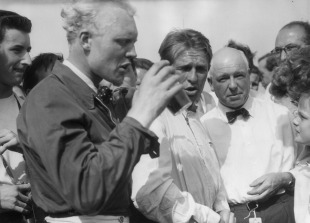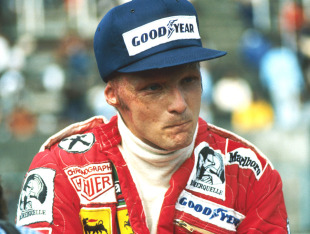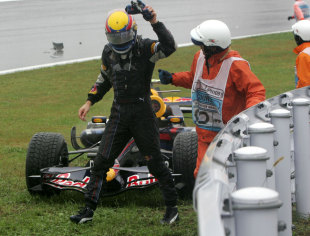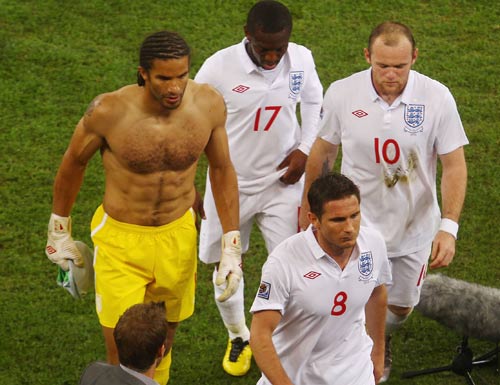- Top ten ... drives despite injury or illness
Beyond the call of duty
Laurence Edmondson October 3, 2011Jenson Button's second place finish in Singapore was made all the more impressive when he revealed he'd not only been fighting Sebastian Vettel during the two-hour race but also food poisoning. But he's not the only F1 driver who's raced on regardless of his health…

- Drivers:
- Gerhard Berger
- |
- Mike Hawthorn
- |
- Niki Lauda
- |
- Tazio Nuvolari
- |
- Alan Stacey
- |
- Jackie Stewart
- |
- Mark Webber
Mike Hawthorn
The first British world champion, Mike Hawthorn, raced hard (and partied harder) despite suffering from an incurable kidney disease. Towards the end of the 1954 season he was admitted to Guy's Hospital in London and underwent surgery to have one of his kidneys removed, which he could barely afford at the time. He kept the operation hushed up in order to hold onto his racing licence and continued as before, both on the track and off it. But his playboy lifestyle wasn't without its discomforts and he admitted that every time he relieved himself it was "like peeing gravel". At 29 years of age he took the 1958 drivers' title with Ferrari but immediately retired as he was starting to experience blackouts. He died in a car crash on the A3 near Guildford in January 1959, but doctors doctors had told him he only had another few years to live due to his disease.
Tazio Nuvolari
Although he never raced in a Formula One world championship race, Tazio Nuvolari fully deserves his place on this list. Not only is he widely regarded as the one of the fastest pre-war racing drivers, he is also heralded as the bravest and most dedicated. Such was his dedication that he would not let minor setbacks such as broken bones stand in his way, and in 1929 raced an Alfa Romeo at the Coppa Ciano with his body in a plaster corset following one of his early motorcycle crashes. In 1934 he broke his leg in an accident while racing in Italy, but returned to the track just four weeks later with his leg in plaster and finished fifth at the AVUS-Rennen in Germany. Two years after that he was thrown out of his cockpit while practising for the Tripoli Grand Prix and broke his ribs. He was told to rest by doctors but ignored their advice, donned another plaster corset and took part in the grand prix regardless.
Mark Webber, 2010
Tweeting under the pseudonym Aussie Grit, Mark Webber has a reputation for telling it like it is in the F1 paddock. But one thing he didn't to mention during the 2010 season was that he was nursing a broken collarbone for the final four races. "On the Sunday morning before [the Japanese Grand Prix at] Suzuka, I got on a mountain bike for the first time since my accident in Tasmania at the end of 2008," he wrote in his book at the end of the year. "I was riding with a great friend of mine. Suddenly, he crashed right in front of me and I had nowhere to go but straight through the ears of the horse! I suffered what they call a skier's fracture to my right shoulder. Suzuka is a brutal track so it was a blessing that the Japanese weather gave me an enforced rest day on the Saturday [when qualifying was rained off], and a pre-race injection helped, too. In the end, we got through the weekend all right." Webber didn't even tell his team principal Christian Horner, who confirmed that he "didn't even know about the book, let alone the shoulder", but did suffer a dip in form and lost his championship lead to team-mate Sebastian Vettel at the last round.

Niki Lauda was lucky to escape with his life after his fiery accident at the Nurburgring in 1976. With horrendous burns to his head and face, he was in a critical condition for several days in hospital before he started to pull through and work towards a recovery. At the time of the accident he had a 23 point lead in the championship (which was actually 31 points when James Hunt's eventual disqualification at the British GP was factored in), but with six races remaining the title was far from secure. As a result Lauda returned to racing just six weeks later at Monza where he finished fourth and shocked onlookers after the race as he removed his helmet to expose a balaclava soaked in blood from his burns. He was also unable to close one of his eyes and his tear-duct mechanism was severely damaged, affecting his vision while driving. He struggled on through the next three rounds - taking a podium at the US Grand Prix - and went into the final race at Fuji with a three-point lead. Race day was met by a torrential downpour and Lauda withdrew from the race after one lap while Hunt went on to take the title. Remarkably some questioned Lauda's courage, but he responded by saying: "There is a limit in any sport of profession."
Alan Stacey
Alan Stacey raced in just seven world championship grands prix in his career, but did so with only one leg. The lower part of his right leg was amputated after a motorbike accident when he was 17 and from that point onwards he drove cars using an adapted hand throttle. One year at the French Grand Prix he and his good friend Jabby Crombac came up with a cunning plan to pass a medical. "There is that test where the doctor touches your knee with a rubber hammer, to check the reflex," Crombac, who was a journalist, wrote. "So Alan showed his proper leg for the first test, then I distracted the doctor's attention and Alan quickly made sure that he tested the same leg again!" Stacey died at the 1960 Belgian Grand Prix when his car veered off the track, climbed a bank and exploded in a nearby field, although witness testimonies suggest he was hit by a bird in the face rather than losing control of the car through any sort of misjudgement.
Gerhard Berger
For the most part injuries and ailments tend to slow drivers down, but in Gerhard Berger's case it appeared to help him to victory at Hockenheim in 1997. The Benetton driver had been on the sidelines for three races ahead of the German Grand Prix due to an operation on his sinuses. Then, just three days before the event, he was also was dealt a massive mental blow when his father died in an air crash. To make matters worse he was still on antibiotics ahead of the race weekend and also had to cope with ongoing rumours that he would get kicked out of his drive at the end of the season. "The team was against me, my health was against me and the emotion from the loss of my father was against me," he told Clyde Brolin in the book Overdrive. "When I arrived in Hockenheim everybody was trying to smile about it and saying, 'We're so happy you're back,' but I could read on their faces they were all thinking, 'What are you doing here?' That's what gave me the push. I just said, 'Sod it.' I went to one of the usual press conferences and, without warning the team, said I was going to stop driving for Benetton at the end of the year. Then I got into the car and said, 'Let's see what we can do." Berger went on to deliver one of the best performances of his career, winning the race in a car that really had no place fighting for victories.
Jackie Stewart
Three-time world champion Jackie Stewart could have been a four-time world champion had he not seriously injured his wrist in 1968. An accident during a Formula 2 race at Jarama meant Stewart missed that year's Spanish and Monaco Grands Prix, and left him with a handicap for much of the remainder of the season. On his return at the Belgian Grand Prix Stewart finished fourth but could have won had his car been properly fuelled. He won the Dutch Grand Prix, came third at the French but struggled to sixth at Brands Hatch where the tight layout put extra pressure on his injury. Then came the most daunting challenge of the season, 14-laps of racing at the Nurburgring. Stewart's wrist was still far from fully healed, but he put in the performance of his career and finished four minutes ahead of his nearest competitor in dire conditions. He took another victory at the US Grand Prix and eventually finished second in the championship, 12 points behind Graham Hill.

Webber also proved his grit at the 2007 Japanese Grand Prix when he vomited in his helmet due to food poisoning but carried on regardless. The conditions were atrocious throughout the race, but that was the least of Webber's concerns in the confined space of the Red Bull cockpit. Midway through the race he came over the radio and, between heaves, said: "I'm going to have to retire, mate. I'm vomiting, I'm vomiting, I can't drive." His sympathetic race engineer responded: "Understood. Box, box, box." To which Webber said: "I'm gonna try and stay out, mate. I'm being sick in the car, but I'll see how I go." Webber actually went very well and was running second when he was rear-ended by Toro Rosso's Sebastian Vettel during a safety car period. In his post-race interview he was understandably upset: "It's kids isn't it, kids with not enough experience. You do a good job and then they f*** it all up."
Nelson Piquet
Nelson Piquet won his final world championship in 1987 despite suffering severe concussion that his engineer Frank Dernie said left him "struggling physically" and "obviously not ultra-fit." Piquet crashed at over 170mph at the Tamburello bend during Friday practice for the San Marino Grand Prix, smashing into the wall sideways after losing control on corner entry. He was heavily concussed and sat out the rest of the weekend but came back for the next round in Belgium despite having trouble sleeping. He retired from that race with an exhaust problem but the results followed soon after with nine consecutive podium despite his ongoing recovery
Nigel Mansell
Plenty of drivers have raced with upset stomachs down the years, but few have had quite as much at stake as Nigel Mansell at the 1986 Mexican Grand Prix. He had the chance to seal the championship with a victory in Mexico City, but on the qualifying day came down with food poisoning. He still managed to stick his car third on the grid, but at the start botched his getaway and dropped to the back of the pack. BBC commentator James Hunt felt particularly sorry for his fellow countryman. "A really problematical afternoon now faces Nigel Mansell," Hunt said after the first lap, "and he's got a physical strength problem of being drained after having Montezuma's revenge yesterday." But Mansell rose to the challenge and dragged his Williams back up to fifth on a circuit that has a number of corners that are bowl-juddering at the best of times. Hunt sang Mansell's praises after the race, too. "I thought he was absolutely fantastic," he told Murray Walker in the post-race analysis. "After the drama of the start, which was a great shame, and considering he was physically debilitated because he was unwell yesterday, he just flew in the second half of the race. And that really is in keeping with what his two teams, Lotus and then Williams, always say about him which is he always tries and he never gives up." But despite overcoming Montezuma in Mexico, Mansell still lost out on the title at the final round of the championship to Alain Prost.
Laurence Edmondson is the deputy editor on ESPNF1
© ESPN Sports Media Ltd.
 Laurence Edmondson is deputy editor of ESPNF1 Laurence Edmondson grew up on a Sunday afternoon diet of Ayrton Senna and Nigel Mansell and first stepped in the paddock as a Bridgestone competition finalist in 2005. He worked for ITV-F1 after graduating from university and has been ESPNF1's deputy editor since 2010
Laurence Edmondson is deputy editor of ESPNF1 Laurence Edmondson grew up on a Sunday afternoon diet of Ayrton Senna and Nigel Mansell and first stepped in the paddock as a Bridgestone competition finalist in 2005. He worked for ITV-F1 after graduating from university and has been ESPNF1's deputy editor since 2010

